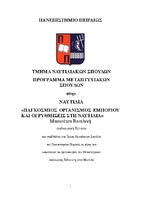Παγκόσμιος Οργανισμός Εμπορίου και οι ρυθμίσεις στη ναυτιλία

Προβολή/
Θεματική επικεφαλίδα
Παγκόσμιος Οργανισμός Εμπορίου ; Ναυτιλία -- Δίκαιο και νομοθεσία ; CabotageΠερίληψη
Ο Παγκόσμιος Οργανισμός Εμπορίου, στον τομέα της οικονομίας, επιχειρεί να εξαλείψει τα εμπόδια του καμποτάζ, τις συμφωνίες για διαχωρισμό της μεταφοράς του φορτίου μεταξύ δυο ή τριών χωρών μόνο, αποκλείοντας από την αγορά τους υπόλοιπους παροχείς υπηρεσιών και της παροχής επιδοτήσεων σε ναυτιλιακές εταιρείες και της κάλυψης των ζημιών τους από τις εκάστοτε κυβερνήσεις. Ο σκοπός των αλλαγών αυτών είναι να επιφέρει καθεστώς ελεύθερου και δίκαιου ανταγωνισμού στο θαλάσσιο εμπόριο. Οι συνέπειες από την άρση αυτών των εμποδίων είναι κατά κύριο λόγο ότι θα μειωθεί το μεταφορικό κόστος, το οποίο δε θα επιβαρύνει τον τελικό καταναλωτή. Επίσης, ναυτιλιακή υπηρεσία θα παρέχεται πιο γρήγορα και ποιοτικότερα, αφού θα λειτουργεί σε καθεστώς ελεύθερου ανταγωνισμού. Τα ανωτέρω ζητήματα θα αναλυθούν στο πρώτο κεφάλαιο της εργασίας. Επιπλέον, ο Παγκόσμιος Οργανισμός Εμπορίου καθώς και άλλοι οργανισμοί έχουν διατυπώσει μια σειρά μέτρων και κανονισμών, επιχειρώντας να επιφέρουν αλλαγές και στους παρακάτω τομείς που αφορούν τη ναυτιλία, όπως στην προστασία του θαλάσσιου περιβάλλοντος, στην πρόληψη της μόλυνσης από τη θαλάσσια ρύπανση, στην προστασία της θαλάσσιας ζωής, στον τομέα της ασφάλειας κατά τη μεταφορά αγαθών στις προδιαγραφές που πρέπει να τηρεί η κατασκευή των πλοίων για να είναι ασφαλή κατά την πλοήγηση τους. Τα ζητήματα αυτά θα αναλυθούν στο δεύτερο κεφάλαιο της εργασίας, εστιάζοντας τις αλλαγές αυτές σε ευρωπαϊκό επίπεδο, αναφέροντας τις Κοινοτικές Οδηγίες που προτείνει η Ευρωπαϊκή Κοινότητα στα μέλη της. Στο τρίτο κεφάλαιο θα αναλυθούν οι ρυθμίσεις στη ναυτική εργασία από τον Παγκόσμιο Οργανισμό Εργασίας. Τέλος, στο τέταρτο κεφάλαιο, θα αναλυθεί η περίπτωση της Ελλάδας, όσο αφορά τις αλλαγές που θα επέλθουν από τις ρυθμίσεις του Παγκόσμιου Οργανισμού Εμπορίου για την άρση του καμποτάζ. Συμπερασματικά, αυτή η εργασία θα τεκμηριώσει αναλυτικά τις αλλαγές που θα επιφέρει ο Παγκόσμιος Οργανισμός Εμπορίου στη ναυτιλία. Επίσης, θα αναλυθούν τα μέτρα και οι πολιτικές που θα πρέπει να ακολουθήσει η ελληνική ναυτιλία για την προσαρμογή της στα νέα δεδομένα.


